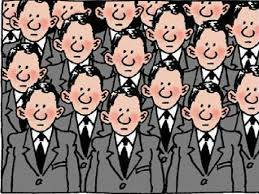
God Myopia
Back in the day, the Des Moines Register, where I worked for 22 years, was a marvel of a newspaper. It had expert writers in so many areas, including a drama writer, a markets columnist and a book and movie reviewer, to say nothing of people who specialized in science, religion, medicine, business, the courts, government and, of course, sports.
Unbelievably for such a small market, Time Magazine named The Register among the top five newspapers in the country in 1985. Like all newspapers today, however, it’s struggling.
One of the best of those Register specialists was Bill Simbro, the religion writer. He covered his topic like a good reporter, looking for stories he knew would be of interest to readers. A former Methodist minister, he sought out good stories wherever he could find them – among Catholics, Protestants, Jews, cultists and non-believers.
Simbro and the Register recognized that religion was important to many readers, that like all the other topics in the news, it was an important part of many people’s lives. It still is. Though religious affiliation has been declining, over 70 percent of Americans call themselves Christian while the number of adherents to other faiths have held steady.
Mostly Ignore It
Though this suggests a strong demand for news about religion, most news outlets – including the Register – mostly ignore it.
Still, as a blogger on the topics for over three years, I can attest that it’s hard to get people’s attention when it comes to God and religion. There are dozens of competing interests, all of which seem much more interesting to modern readers.
Society appears to be indifferent, at best, to the question of God. Research shows that even many people who go to church regularly live their lives as if there were no God. They go through their days never referring to their beliefs and ignoring them on social and political issues.
Most Americans say they believe in God but many are vague about what that entails. They pray mainly when they are in trouble or need a “favor.” They avoid articles and broadcasts that aim to inform them. They may think that sometime in the foggy future they will commit to God and religion, but in the meantime, there are “important” things on which to focus.
In the blogging world, if you want readers, you write about food, exercise, pets, sports or politics. You’ll get plenty of interest.
Makes Demands
I believe many people avoid thinking about faith because it makes demands on them and appears to contradict what they know from everyday life. Faith, they perceive, does nothing to promote their “pursuit of happiness,” a noble goal.
Faith also contradicts science, according to the popular view. Faith, it is said, promotes belief in the “unbelievable” – in the case of Christianity things like the virgin birth, the miracles of the gospels, the “tolerance of evil by an all-good” God.
Then you have the teaching of religions on social issues, particularly on sexuality, consumerism and end-of-life issues. They don’t align with the values that are promoted in society.
But does the popularity of opinions determine their validity? Isn’t it possible that, as religious people for centuries have claimed, the universe is saturated with God, that God is in us and around us and in and around the earth’s billions of people, whether they acknowledge it or not? And isn’t religion the obvious way of expressing faith?
Big Stumbling Blocks
I know that the faith issues mentioned above are big stumbling blocks for many. Not for me. Once I get past the question of a God who created the universe – admittedly in a way that is not understood in or outside of religion – I can accept for good reason any of the other “incredible” issues mentioned. They’re small potatoes by comparison.
I believe we’re all infected with a kind of communal myopia, a condition in which we see clearly things that are close but things farther away are blurry. Immediate rewards are clear, delayed rewards are fuzzy. Faith promises mostly delayed rewards but we have to have clear vision to detect them.
Vision is an important metaphor in the Bible. Lack of clear vision signifies a lack of spiritual insight. The messianic message in the Hebrew Bible is “a light to the blind.” Jesus calls the Pharisees of his time “the blind leading the blind.” And the healing of blindness is one of the hallmarks of his mission.
I’m trying to help people see more clearly in these blogs, and in doing so, trying to help myself do the same. I’m probably not grateful enough that sometimes, both may actually happen.





